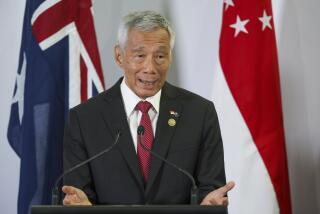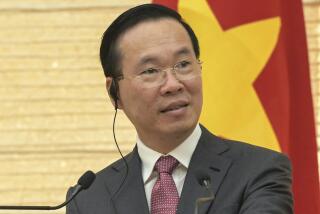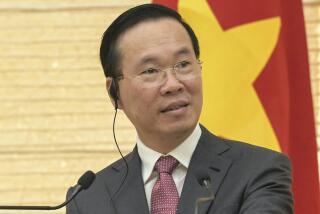Chun Quits Panel, Cuts Last Tie to Power : Ex-S. Korean President Voices Regret for Accused Brother’s Acts
Former President Chun Doo Hwan, expressing regret over a scandal involving his younger brother, severed his last official links to power Wednesday, less than two weeks before a crucial electoral test of South Korea’s fledgling democracy.
Chun, who ruled South Korea for nearly eight years after a military coup in 1980, announced his resignation as head of the Council of Elders, an advisory panel of former presidents and senior statesmen, and as honorary president of the ruling Democratic Justice Party. A short time earlier, the ruling party had forced through the National Assembly a law that gives more power to the Council of Elders.
Chun’s announcement came at a time of widespread speculation that he was engaged in a discreet power struggle with his successor, President Roh Tae Woo, who took office Feb. 25.
He accepted responsibility for the alleged misdeeds of his brother, Chun Kyung Hwan, former head of the Saemaul Movement, a quasi-government development agency. The younger Chun was arrested March 31 on charges of embezzling $8.6 million and evading $1.5 million in taxes.
“I am to blame for failing to control the behavior of my brother,” Chun told a news conference.
To End ‘Misunderstanding’
He said he will ask the Ilhae Foundation, a research institute he established and that last fall was suspected of fund-raising irregularities, to stop calling itself by his pseudonym, “Il Hae.” He said this will eliminate “any misunderstanding that the foundation is a political institute” under his control. Many prominent Koreans assume informal pseudonyms, much as writers adopt pen names.
Chun said he will retain membership in the ruling party, which he founded in 1981, but without power or authority.
He stepped down exactly a year after declaring last April 13 that he was suspending debate on constitutional revisions and that his successor would be named not by popular vote but by a rubber-stamp electoral college. Widespread protests in June induced Roh to propose a direct presidential election and democratic reforms, and Chun reluctantly conceded.
It was unclear what effect Chun’s resignation will have on the April 26 election for the National Assembly, but there is no indication that the transfer of power to Roh will not continue to proceed smoothly.
As many analysts see it, the resignation of Chun, who personally selected Roh as his successor, and the arrest of his younger brother will help the new president distance himself from Chun’s highly unpopular regime.
Opposition parties have turned the allegations of official corruption involving Chun’s brother into a major campaign issue. Some critics charge that suspicion extends to other family members, even to the former president. And according to the opposition, Roh’s government is no different from Chun’s.
The ruling Democratic Justice Party hopes to get 40% of the popular vote and 155 Assembly seats, or 55% of the 299 seats at stake, including those apportioned by means of proportional representation. Seventy-five seats are assigned on the basis of the number of seats the parties win in 224 single-member districts.
As recently as four months ago, no one thought the ruling party could win a majority in the Assembly, but foreign and South Korean analysts now view the party’s goal as conservative. Both major opposition parties have conceded that neither will win a majority, and both have set a goal of becoming the No. 1 opposition group.
A Western diplomat said he thinks the Democratic Justice Party will win 60% of the seats in the Assembly, citing the split in the opposition and public disillusionment with its two principal leaders, Kim Young Sam and Kim Dae Jung.
Rep. Lee Choong Jae, one of the leaders of Kim Dae Jung’s Party for Peace and Democracy, said the opposition is “about to suffer a disgrace that will remain in Korean political history, and I don’t want to be part of that disgrace.” Lee, a five-term lawmaker, said he will not run again.
Wednesday was the deadline for filing, and 1,045 candidates have registered, indicating that every government party candidate will face at least three opponents. In the most hotly contested race, there are nine opposition candidates.
More to Read
Start your day right
Sign up for Essential California for news, features and recommendations from the L.A. Times and beyond in your inbox six days a week.
You may occasionally receive promotional content from the Los Angeles Times.






